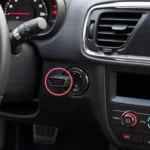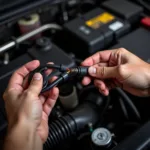Finding the right OBD2 scanner can feel like navigating a maze of technical jargon and confusing product descriptions. But don’t worry, we’re here to help. This guide will break down everything you need to know about OBD2 scanner reviews from reputable sources like Consumer Reports, so you can make an informed decision and get back on the road with confidence.
Why You Should Care About OBD2 Scanner Reviews
Whether you’re a seasoned mechanic or a car enthusiast looking to demystify those pesky check engine lights, an OBD2 scanner is an invaluable tool. These handy devices plug into your car’s computer system, revealing diagnostic trouble codes (DTCs) that pinpoint the root of automotive issues.
But with a plethora of OBD2 scanners flooding the market, how do you separate the gems from the duds? That’s where consumer reports come in. Independent reviews provide unbiased insights into a scanner’s:
- Accuracy: Does it accurately read and interpret DTCs?
- Ease of Use: Is the interface user-friendly, even for beginners?
- Features: Does it offer additional functions like live data streaming or emissions readiness checks?
- Durability: Is it built to last or will it fall apart after a few uses?
- Value for Money: Does its performance justify the price tag?
By understanding what to look for in OBD2 scanner reviews, you can avoid costly mistakes and invest in a scanner that meets your specific needs and budget.
Decoding OBD2 Scanner Consumer Reports: Key Factors to Consider
Consumer Reports and similar organizations typically evaluate OBD2 scanners based on rigorous testing and real-user feedback. Here are some critical aspects often highlighted in their reviews:
1. Type of Scanner: Matching Your Needs
- Basic Code Readers: These budget-friendly options retrieve and display basic DTCs, perfect for DIY enthusiasts tackling simple repairs.
- Bluetooth Scanners: Offering greater convenience, these scanners connect wirelessly to your smartphone or tablet, providing access to more advanced features and data analysis through dedicated apps.
- Professional-Grade Scan Tools: Designed for mechanics and experienced users, these comprehensive scanners offer advanced diagnostics, programming capabilities, and access to manufacturer-specific codes.
2. Vehicle Compatibility: Ensuring a Seamless Connection
Before you hit that “buy now” button, ensure the scanner you choose is compatible with your vehicle’s make, model, and year. Some scanners are designed for specific car brands while others offer universal compatibility.
3. User Interface and Display: Navigating with Ease
A user-friendly interface can make all the difference. Look for scanners with intuitive menus, clear instructions, and easy-to-read displays, especially if you’re new to automotive diagnostics.
4. Features and Functionality: Beyond Basic Diagnostics
OBD2 scanners come equipped with a range of features. Consider what’s essential for your needs:
- Live Data Streaming: Monitor real-time engine parameters like RPM, coolant temperature, and oxygen sensor readings.
- Smog Check Readiness: Determine if your vehicle is ready to pass an emissions test.
- ABS and Airbag Diagnostics: Access and troubleshoot issues related to anti-lock brakes and airbag systems.
- Data Logging and Reporting: Record and analyze data over time, helpful for diagnosing intermittent problems.
5. Durability and Warranty: Investing in Longevity
A reliable OBD2 scanner should be built to withstand the rigors of regular use. Look for scanners with sturdy construction, quality materials, and a comprehensive warranty for peace of mind.
Beyond Consumer Reports: Tips for In-Depth Research
While Consumer Reports offers valuable insights, don’t stop there. Here are some additional ways to conduct thorough research:
- Read Online Reviews: Explore user reviews on reputable e-commerce websites and automotive forums for real-world experiences and potential drawbacks.
- Watch Product Demonstrations: YouTube videos provide visual walkthroughs of scanner features and functionalities.
- Compare Prices and Features: Utilize online comparison tools to compare different models side-by-side and find the best value for your money.
Choosing the Right OBD2 Scanner: A Wise Investment
Investing in the right OBD2 scanner can save you time, money, and frustration in the long run. By leveraging the power of consumer reports and conducting thorough research, you can equip yourself with a reliable diagnostic tool that empowers you to take control of your vehicle’s health. Remember, a little knowledge goes a long way in the world of automotive diagnostics.
Frequently Asked Questions About OBD2 Scanners
1. What is an OBD2 scanner used for?
OBD2 scanners are electronic devices that connect to your vehicle’s computer system to retrieve diagnostic trouble codes (DTCs) and other vital data, allowing you to diagnose and troubleshoot car problems.
2. Do I need a professional mechanic to use an OBD2 scanner?
Not necessarily. While professional-grade scanners are more complex, there are many user-friendly options available for DIY enthusiasts and everyday car owners.
3. Can an OBD2 scanner clear my check engine light?
Yes, most OBD2 scanners have the ability to clear DTCs and turn off the check engine light. However, it’s important to address the underlying issue that triggered the light in the first place.
4. How often should I use my OBD2 scanner?
It’s a good practice to use your OBD2 scanner periodically, even when your car seems to be running smoothly, to catch potential issues early.
5. Can an OBD2 scanner tell me when my next oil change is due?
Some advanced OBD2 scanners offer maintenance reminders, but this feature is not available on all models.
Still have questions?
Contact us on WhatsApp: +1(641)206-8880 or email us at [email protected]. Our team is available 24/7 to assist you.

